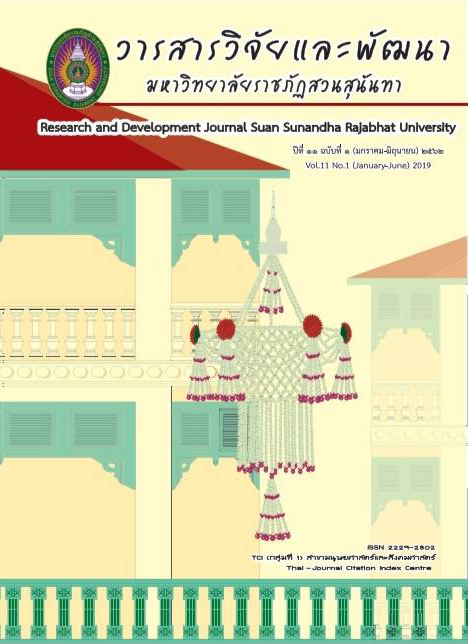ปัจจัยที่มีผลต่อการปฏิบัติการบัญชีเพื่อการจัดการสิ่งแวดล้อมของบริษัทที่ได้รับการรับรองมาตรฐาน ISO 14001
DOI:
https://doi.org/10.53848/irdssru.v11i1.151334คำสำคัญ:
การปฏิบัติการบัญชีเพื่อการจัดการสิ่งแวดล้อม, บริษัทที่ได้รับการรับรองมาตรฐาน ISO 14001บทคัดย่อ
การศึกษาวิจัยครั้งนี้มีวัตถุประสงค์เพื่อศึกษาทัศนคติและปัจจัยที่มีผลต่อการปฏิบัติการบัญชี เพื่อการจัดการสิ่งแวดล้อมของบริษัทที่ได้รับการรับรองมาตรฐาน ISO 14001 ผู้วิจัยทำการเก็บรวบรวมข้อมูลในการศึกษาวิจัยด้วยแบบสอบถาม จากกลุ่มตัวอย่าง จำนวน 400 ตัวอย่างผลการศึกษาพบว่า ปัจจัยที่ส่งผลต่อการปฏิบัติการบัญชีเพื่อการจัดการสิ่งแวดล้อมมากที่สุด คือ ด้านความรับผิดชอบต่อสังคมด้านสิ่งแวดล้อม ( = 3.79, S.D. = 0.56) รองลงมาคือ ด้านแรงผลักดันจากผู้มีส่วนได้เสีย ( = 3.72, S.D. = 0.77) ด้านนโยบายการบัญชีสิ่งแวดล้อมของฝ่ายบริหาร ( = 3.70, S.D. = 0.51) ด้านนโยบายการบัญชีสิ่งแวดล้อมของรัฐ ( = 3.59, S.D. = 0.51) และด้านความเชี่ยวชาญของนักบัญชี ( = 2.96, S.D. = 0.78) ตามลำดับ
เอกสารอ้างอิง
Bouten, L., & Hoozee, S. (2013). On the interplay between environmental reporting and management accounting chane. Management Accounting Research, 24(4), pp. 333-348.
Chang, H., & Deegan, C. (2008). Environmental management accounting and environmental accountability within universities: Current practice and future potential. Environmental Management Accounting for Cleane Production, Springer, United Kingdom, pp. 301-320.
Conrad, K. (2005). Price Competition and Product Differentiation when Consumers Care for the Environment. Environmental and Resource Economics, 31, pp. 1-19
Farneti, F., & Guthrie, J. (2009). Sustainability reporting by Australian public sector organizations: Why they report. Accounting Forum, 33(2), 89-98.
Hunag, C.L., & Kung, F.H. (2010). Drivers of Environmental Disclosure and Stakeholder Expectation: Evidence from Taiwan. Journal of Business Ethics, 96(3), pp. 435-451.
IFAC International Federation of Accountants. (2005).Guidance Document: Environmental Management Accounting, International Federation of Accountants. New York, NY.
Jalaludin, D., Sulaiman, M., & Ahmad, N.N.N. (2011). Understanding environmental management accounting (EMA) adoption: a new institutional sociology perspective. Social Responsibility Journal, 7(4), pp. 540-557.
Nakasone, G.T. (2015). Environmental Accounting in Peru: A Proposal Based on the Sustainability Reporting in the Mining, Oil and Gas Industries. Contabilidady Negocios, 19(10), pp. 5-26.
Staniskis, J.K., & Stasiskiene, Z. (2006). Environmental management accounting in Lithuania: Exploratory study of current practices, opportunities and strategic intents. Journal of Cleaner Production, 14, pp. 1252-1261.
Tangpinyoputtikhun, Y., & Ussahawanitchakit, P. (2009). Roles of Governance-Based Practices in Accounting Information Effectiveness and Firm Growth of Thai-Listed Firms. Journal of International Business and Economics, 9(2), 389-411.
Thai Industrial Standards Institute. (2016). A List of Certified ISO 14001 Companies. Retrieved. 21 February 2016, from https://app.tisi. go.th/syscer/ 14000_t.html
Vichakprasert, P. (2010). TDRI report on the survey of people's attitudes towards environmental problems in Thailand. Thailand Development Research Institute. On December 2009.
ดาวน์โหลด
เผยแพร่แล้ว
รูปแบบการอ้างอิง
ฉบับ
ประเภทบทความ
สัญญาอนุญาต
บทความที่ได้รับการตีพิมพ์เป็นลิขสิทธิ์ของ สถาบันวิจัยและพัฒนา มหาวิทยาลัยราชภัฎสวนสุนันทา
ข้อความที่ปรากฏในบทความแต่ละเรื่องในวารสารวิชาการเล่มนี้เป็นความคิดเห็นส่วนตัวของผู้เขียนแต่ละท่านไม่เกี่ยวข้องกับมหาวิทยาลัยราชภัฎสวนสุนันทา และคณาจารย์ท่านอื่นๆในมหาวิทยาลัยฯ แต่อย่างใด ความรับผิดชอบองค์ประกอบทั้งหมดของบทความแต่ละเรื่องเป็นของผู้เขียนแต่ละท่าน หากมีความผิดพลาดใดๆ ผู้เขียนแต่ละท่านจะรับผิดชอบบทความของตนเองแต่ผู้เดียว





